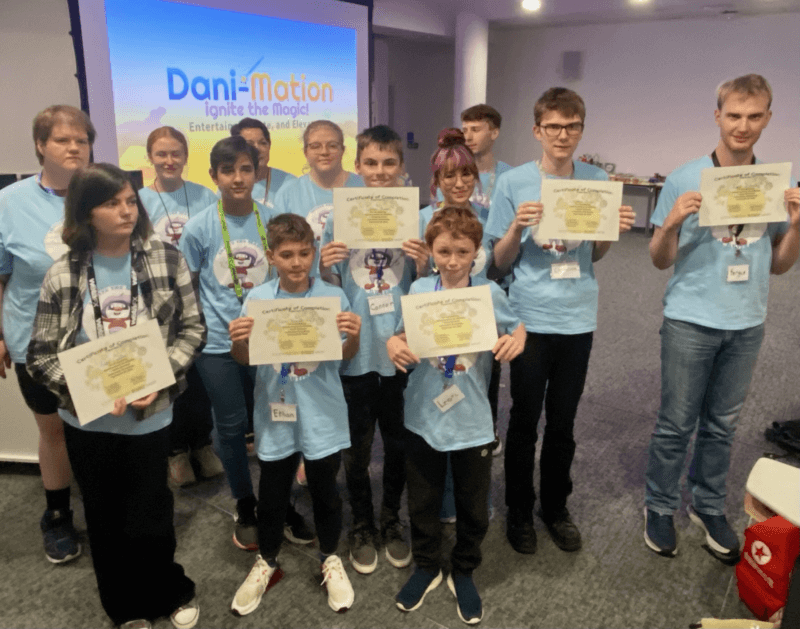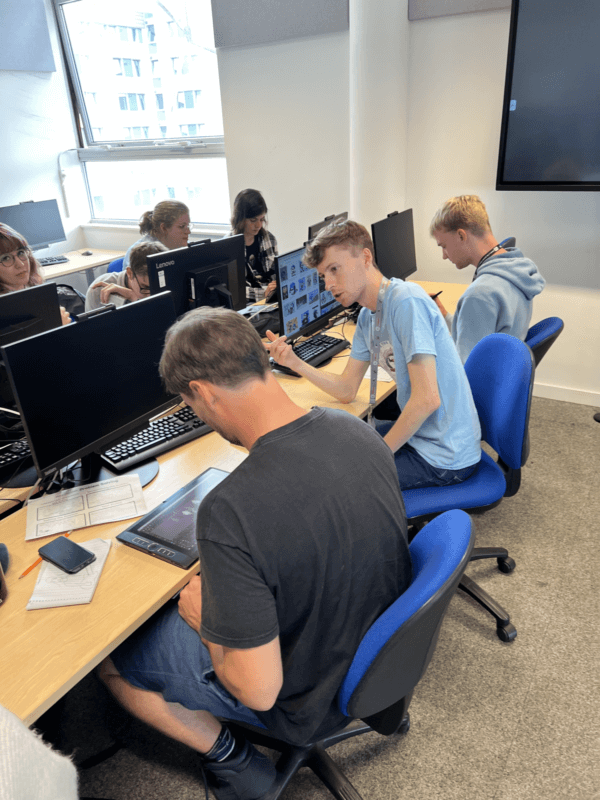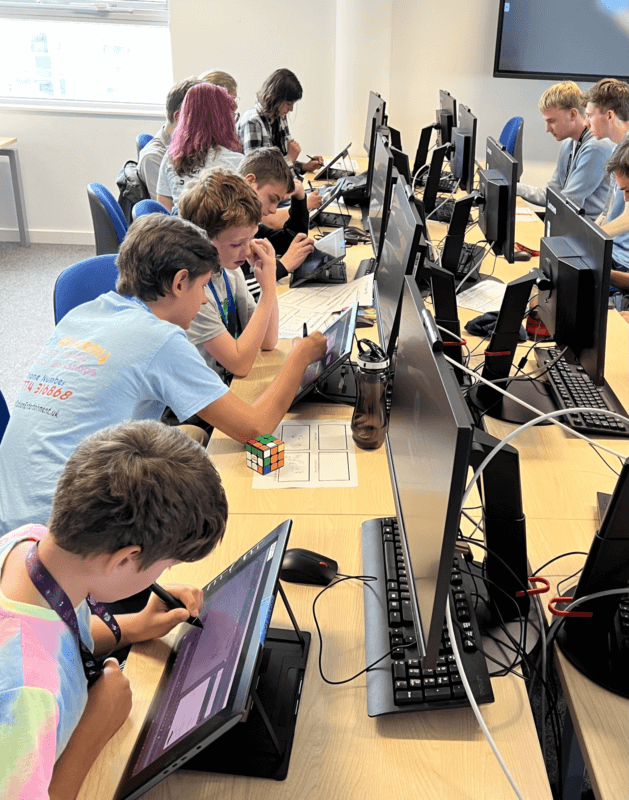DaniMation Returns for Animation Camp for Autistic Students to UK: Interview with Dani Bowman, Joe Westlake, Sandy Vielma
Back in April, I had the opportunity to interview Dani Bowman, an autistic woman who has been teaching young people on the same spectrum for years how to become animators through her company, DaniMation Entertainment. And after two years, she finally returned to the University of Plymouth in the summer, as well as expanding to a second in London, to continue her work in the UK.
On the last day of their workshop in Plymouth, I got the opportunity to speak with Dani in person as well as Sandy Vielma, the Social Media Director of DaniMation, and Joe Westlake, founder of DaniMation UK, to discuss what made them want to expand their classes outside of the US and how the week-long workshop has impacted their students.
Joe, would you mind just telling everyone a bit about yourself and how you got involved with DaniMation Entertainment?
Joe: It originally started out when I was working within the autism community for advocacy. I ran a host of online radio shows and that’s how Dani found me and we kind of grew a connection. Dani was doing animation when she established DaniMation in 2009 in the US, so that was quite a bit of time before we actually established it here with DaniMation UK.
I really liked the model of DaniMation. It’s helping individuals on the spectrum with animation which is such a niche area and I realised that what’s happening in America is fantastic, but it’s not something that we really appear to have in the UK. There’s a lack of opportunities for people on the spectrum to pursue the skills for animation and to go into a career of animation or digital arts. I was a student here and we came up with a great partnership with the Plymouth Institute of Education, and Dr. Suanne Gibson, who was one of my lead lecturers. She’s really been great and piloting this whole project with us.
We held our first camp here at the University of Plymouth in August 2019 and we had 14 students. We had some come from as far as London and Manchester, as well as the surrounding area. We tought the basic principles of animation. We did storyboarding, voiceovers, learning the Toon Boom software, and the basic principles of animation and in view of them having 15 to 30 seconds of animation, there’s so much work that goes into animating.
Dani: They could become voice actors if they can, or they can be storyboard artists or people who do visual development like backgrounds or somebody who’s good with computers and CGI animation and programming. They can work on that, so it’s not just the art side of animation.
Sandy: This week’s an introduction for youth on the autism spectrum to learn about all the different areas of animation, but it’s being presented and shown in a way to create a future for themselves by a peer. Because Dani is on the autism spectrum, just like them, they are shown that she’s doing it so therefore, they could do it too. And that is the main message that we try to instil upon all the students is that it doesn’t matter how young they are, because she started when she was 11. No matter what people tell you if “you can’t do this, or you can’t do that,” don’t listen to them, you could do anything you want. And because somebody just like her was doing it, you could do it too.
One of Dani’s students she had from the camp in 2019 is now here as an intern, working with us and teaching the other students right now. She started off as a student and now she’s decided to get her degree in animation. But this is just one example here in the UK. We have the same exact scenario happening all over the US. It’s more than just a fun camp.
Dani, with your success with the workshops in the US, why did you turn your attention to the UK?
Dani: It was all thanks to Joe Westlake’s idea of wanting to start the UK branch and because he wanted to start the UK branch for DaniMation, I felt so invited and I felt so eager about doing this offer for Joe.
Joe: I think the key thing is that we’ve been really lucky because having the partnership with the University really helped us because it also goes hand in hand with what goes on in the Institute of Education here because a lot of research and work goes on around autism as well. So we’re able to establish a number of partnerships which benefits not only animation, but also the university and the outreach work that goes on in a community of families with children with autism or young adults. Whether or not they live on their own or they’re on the spectrum, it’s all about advocating and helping them to pursue their passions because of limited opportunities.
Dani: I’ve always wanted to teach animation to us on the autism spectrum to different parts of the world, not just in person, but online as well. I think that helped open doors.
Dani, why do you teach your students Toon Boom Harmony?
Dani: Toon Boom Harmony has been my sponsor when I started my animation company in 2009 and it was all thanks to Patrick’s (Chief Executive Officer and Co-Founder) relationship with them. He was searching for professional software for me to use. At first when Patrick put me on the software, I was a little confused and not so sure what to do. But over time, when I got used to it, I liked doing all the animations on it.
Sandy: It’s accessible to us because they’re her sponsor, and all animation studios actually use it. It’s not just a game to play with. It’s pretty amazing the way that in five days, they learned how to tell a story, how to do a storyboard, they learn the software and how to put their stories into a little animation. They create the animation, they add sound, they add music.
Dani: It can be really fun. You’re not here to be watching cartoons. You are here to learn the animation production pipeline from development, pre production, production to post production and seeing the results from the audience. This year, we do have an assistant who was a previous student and we have seen her development from when she first attended our camp and we looked at her and saw a big improvement.
According to a poll conducted by Respect Ability, just 12% of employees in animation and visual effects in 2019 had a disability of some form or another. How do you think Danimation or other animation studios and companies in the UK could change this?
Joe: What I would say is yes, up until now, there is a low level of people with autism working in industries, particularly animation. However, there is a clear shift in that happening. I would say that in animation, we strive to make that change. But we also realised the importance of working with other large organisations in terms of this question and changing patterns in this.
Sandy: It’s always been really, really low, historically. But we’re really excited to see companies opening up more to the possibilities of working with us and helping out our community and other abilities, but especially our community, because that’s what we focus on to accept and understand.
Joe: You can imagine, for somebody on the autism spectrum, who may have varying sensory issues or a whole host of things, is immediately more accessible to them as well because they can do it from their own home on Zoom. So it’s actually becoming more friendly that way as well. Whilst we foster in our in person camps, the importance of working on social skills, we’ve got that hybrid which is great because we’ve kind of got the best of both worlds and supporting them. If this doesn’t work for you, let’s start with this and then work towards something in the middle. That’s our main aim is that they envision the spectrum that can be done in motion are progressing, we’re teaching them the basic skills but also pointing them in the right direction of companies or further study to actually pursue what they want to do in the animation industry.

This year’s students from the Plymouth workshop with their certificates. Photo provided by DaniMation.
What impact do you hope the workshop will have on your students after this week?
Dani: I’ve thought the impact I will always want for my students is to feel that they can do animation. And they feel like they’re motivated, they’re able to do it. They could be able to finish the job and finish the deadline, they should feel that they’re accomplished and wanted to do more. It’s only the beginning after they finish the camp and if they want to do more, they’re more willing to do it.
After the interview, I was invited to meet the students who showed me their work and discussed their projects. Seeing their work on the big screen and meeting with the parents and guardians, it was clear that everyone in the room was behind Dani and what she was bringing to the UK. And hopefully, we will both meet again to discuss more about her work and the growth of the animation industry.
Below are all of the students’ work as well as the people who contributed to this year’s workshop in Plymouth for everyone to enjoy.



